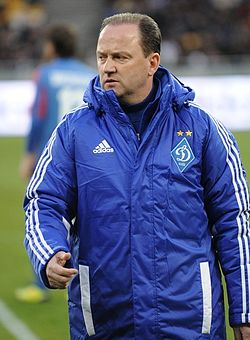| 1986 Ballon d'Or | |
|---|---|
 1986 Ballon d'Or winner Igor Belanov in 2012 | |
| Date | 30 December 1986 |
| Presented by | France Football |
| Highlights | |
| Won by | |
| Website | francefootball.fr/ballon-d-or |
The 1986 Ballon d'Or, given to the best football player in Europe as judged by a panel of sports journalists from UEFA member countries, was awarded to Soviet forward Igor Belanov on 30 December 1986. [1] There were 26 voters, from Austria, Belgium, Bulgaria, Czechoslovakia, Denmark, East Germany, England, Finland, France, Greece, Hungary, Italy, Luxembourg, the Netherlands, Poland, Portugal, Republic of Ireland, Romania, Scotland, Soviet Union, Spain, Sweden, Switzerland, Turkey, West Germany and Yugoslavia. [2] Belanov became the second Ukrainian national to win the award after Oleg Blokhin (1975).